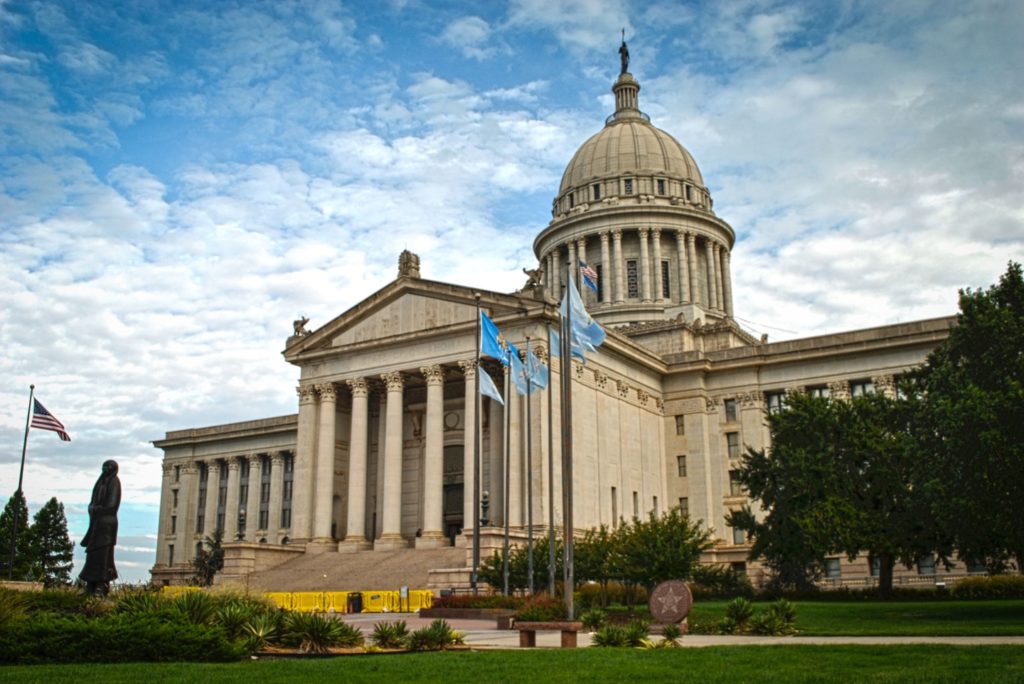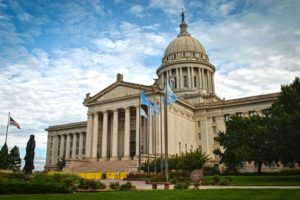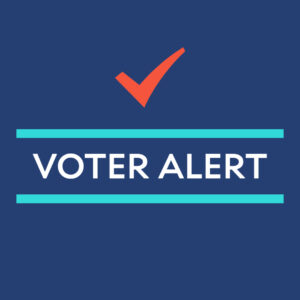OKLAHOMA CITY – The Oklahoma Legislature met Monday and approved measures to stabilize the state budget and affirm the governor’s health emergency declaration in response to COVID-19.
The Oklahoma Senate met in special session and regular session on Monday and employed social distancing measures to protect the health and safety of the senators and few essential staff working at the Capitol. Some of those measures included checking temperatures of those entering the Capitol, limiting the number of senators on the Senate floor to 10 at a time, and wearing cloth masks sewn by a Senate staffer.
The current state budget experienced a revenue failure of approximately $416 million due to the ongoing coronavirus pandemic and a steep drop in the price of oil and natural gas. In regular session, the Oklahoma Senate met and advanced measures to allow the use of state savings to prevent automatic budget cuts of approximately 6 percent because of the revenue failure.
“The state has total savings of approximately $1 billion for times just like this. It is appropriate for the Legislature to use these savings to prevent budget cuts to all state agencies, including those working hard right now to protect the health and safety of Oklahomans during the COVID-19 pandemic,” said Senate President Pro Tem Greg Treat, R-Oklahoma City. “Using savings and reserve funding will ensure agency budgets are kept whole and that critical services continue to be delivered to Oklahomans. I appreciate the work of our Senate appropriations chairman and the Senate budget staff on these measures to shore up the current state budget.”
The budget stabilization bills are:
- Senate Bill 1053, which sends $201.6 million from the Rainy Day Fund to the Revenue Stabilization Fund.
- Senate Bill 199, which sends $302.3 million from the Rainy Day Fund to the General Revenue Fund.
- Senate Bill 617, which authorizes the Office of Management and Enterprise Services to withdraw up to half of the balance of the Revenue Stabilization Fund to avoid cuts to agencies and the 1017 fund for education in a revenue failure in the current fiscal year.
In total, the Legislature approved withdrawing $503.9 million from the Rainy Day Fund. Any excess funds will remain in the Revenue Stabilization Fund for use by the Legislature and executive branch budget officials in addressing potential future revenue failures. After the withdrawals, the Rainy Day Fund balance is $302.3 million and the Revenue Stabilization Fund balance is $349.7 million.
In special session earlier Monday, the Senate met and affirmed the Governor’s health emergency declaration in accordance with the provisions of 63 O.S. § 6101 – 6900 due to the ongoing COVID-19 pandemic. The declaration, which gives the Governor additional authority to coordinate the overall state response to COVID-19, also included a call for a special session of the Legislature to approve or reject the governor’s declaration.
The two measures approved by the Senate in special session were:
- House Concurrent Resolution 1001x, which affirmed the governor’s health emergency declaration; and
- House Concurrent Resolution 1002x, which allowed the special session to remain recessed for longer than three days.
“The coronavirus poses a significant threat to the health and safety of Oklahomans and it must be taken seriously. We must do all we can to protect life at every stage. That’s why the Senate voted to approve the governor’s health emergency declaration to assist in the coordination of the response to this threat on a statewide level,” Treat said.
The resolution approving the health emergency declaration included a provision that the Senate pro tem and House speaker would be given prior notice by the governor before any specific statutes or regulations were suspended under the health emergency declaration.
“There was some concern among lawmakers, the media and the public about prior notification of when rules and regulations would be waived as a part of the COVID-19 response. By adding a provision that the Senate and House leaders be notified before that occurred, we are able to maintain appropriate checks and balances while maintaining flexibility for the governor to direct and enact the state response to this health care crisis,” Treat said.
The special session resolutions are effective immediately. The special session adjourned to the call of the chair. The Legislature, if necessary, could reconvene within the next 30 days to address any other issues related to the health emergency declaration.
Additionally, during regular session the Senate adopted Senate Resolution 17 and a motion from Treat and Senator Kay Floyd to suspend certain rules in order to allow the chamber more flexibility to conduct business for the remainder of the session.
“Traditionally, the rules of the Senate have required members to be physically present for committee meetings and Senate floor proceedings. The ongoing health emergency, where health officials recommend limited in-person interactions, presents challenges for the Senate to conduct official business. That’s why the Senate waived certain rules so that for the remainder of this session and the special session, we can have flexibility to conduct official business, while still following health recommendations for social distancing,” Treat said.
Treat said the Senate granted senators permission to remotely or virtually participate in committee meetings and Senate floor proceedings. He said final implementation plans would be made public, and that the Senate would ensure the public could follow those proceedings online.








